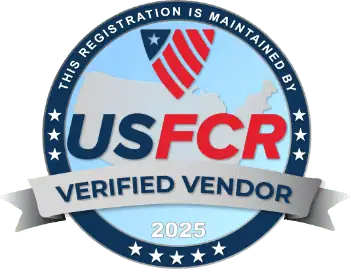TopKey Construction is registered and certified with SAM.gov, through the U.S. Federal Contractor Registration program. This allows our teams to take on a ton of different projects with the federal government, truly expanding our business. But, getting there had its challenges, and we wanted to help any other commercial contracting company tackle the government contracting process.
This guide breaks down what it takes to become a government contractor, how to search contract opportunities, and what systems and steps are involved. Whether you’re a small business or a major player aiming to become a prime contractor or pursue subcontracting opportunities, here’s how to get started.
Why Government Contracting Matters for Commercial Businesses
There may be some additional red tape and requirements to work through when it comes to government contracts, but it can be an important branch of any contracting business. Learning how to get government contracts provides a reliable source of work for contractors, as well as clear payment structures and stability that other industries don’t provide.
That’s not to say federal projects are a sure thing. They’re often at the whim of new regulations and agencies can lose funding. However, these contracts are generally more secure and well-funded. But winning them requires navigating strict regulations, tight deadlines, and a highly structured procurement process.
How to Become a Government Contractor: Step-By-Step
Step 1: You Need to Get Registered in the Right Systems
Before you can bid on any federal government work, you need to know and utilize the correct systems. Your business needs to register in key databases:
Get a Unique Entity ID
Formerly known as a DUNS number, unique entity IDs are now assigned through SAM.gov. This ID identifies your company to government agencies and is required for all contracting work. Consider this the first step of your government contracting future.
Register with SAM.gov
SAM.gov is the System for Award Management (SAM), and it’s the official database for all federal contractors. You must have an active SAM registration to search contract opportunities, receive payments, and appear in interested vendor lists. It’s truly the backbone of federal contracting.
Step 2: Know Your NAICS Code and Capabilities
Every government contractor is categorized by NAICS codes. Short for North American Industry Classification System, NAICS code helps government buyers find businesses in specific industries, or based on the type of work they perform. A business similar to TopKey might register under:
- 236220 – Commercial and Institutional Building Construction
- 238160 – Roofing Contractors
You’ll need to know your NAICS code to identify potential opportunities and market your services to the right agencies.
The Small Business Administration (SBA) can be an excellent resource, as well. The SBA’s small business programs can give your company a competitive edge, with programs designed to ensure a level playing field for:
- Disadvantaged businesses
- Women-owned businesses
- Veteran-owned businesses
- HUBZone firms
If your business fits into one of these categories, make sure to give the SBA some thought. Enrolling in a business development program with the SBA can help you win contracts that are set aside specifically for small or minority-owned businesses.
Step 4: Start Searching for Contract Opportunities
Once you’re fully registered, you’ll need to search contract opportunities. SAM.gov is the place to start. Use filters to narrow your search by NAICS, agency, location, and notice type, such as pre-solicitation notices, solicitation notices, award notices, and sole source notices.
Tip: Make sure to save searches relevant to the work you perform and join interested vendor lists. This will help you stay top-of-mind for contracting officers with subcontracting opportunities sending requests for bids.
Step 5: Understand the Contracting Process
For registered contractors and builders, it’s not difficult to understand the federal contracting process. It’s standardized and easy to follow in order to compete for a job. However, it tends to be a little more competitive than they might expect. Companies will typically go through the following steps of the government contracting process:
- Solicitation phase: The government agency posts a project request.
- Proposal phase: Your company submits a detailed bid or quote.
- Award phase: The contracting officer evaluates submissions and selects a contractor.
As one might expect with the federal government, these steps take time. However, some projects may be awarded under simplified acquisition procedures, which are faster and easier for small businesses to win. Others may be direct awards under sole-source conditions, such as when only one business can possibly meet the agency’s needs.
Step 6: Market Your Business to Federal Buyers
If you’re waiting for bid opportunities to fall into your lap, you’ll never be a successful government contractor. Proactive government contractors take several different steps to market their products and services, including:
- Connecting with small business offices at each federal agency
- Building relationships with contracting officers
- Uploading capability statements to interested vendor lists
- Exploring opportunities on the GSA Schedule (General Services Administration), which allows pre-approved vendors to sell directly to government buyers
Step 7: Stay Compliant—and Persistent
Winning a government contract is just the beginning. Just as you need to keep up on your licenses and insurance policies, you need to stay compliant to be a government contractor. This means understanding regulations, meeting deadlines and expiration dates, and consistently delivering services. Keep records, monitor your performance, and review award management systems regularly.
Also, don’t get discouraged. Many small businesses submit multiple bids before winning their first contract. Use each experience to improve your proposal quality and expand your network of federal buyers and contacts.
Ready to Break into Federal Contracting?
At TopKey Construction, we’ve built our business on delivering high-performance commercial construction projects. We’re able to take advantage of government contracting opportunities, allowing us to continue growing. With the right registrations, research, and relationships, your business can access a steady pipeline of contracts from federal agencies seeking trusted contractors, too.


